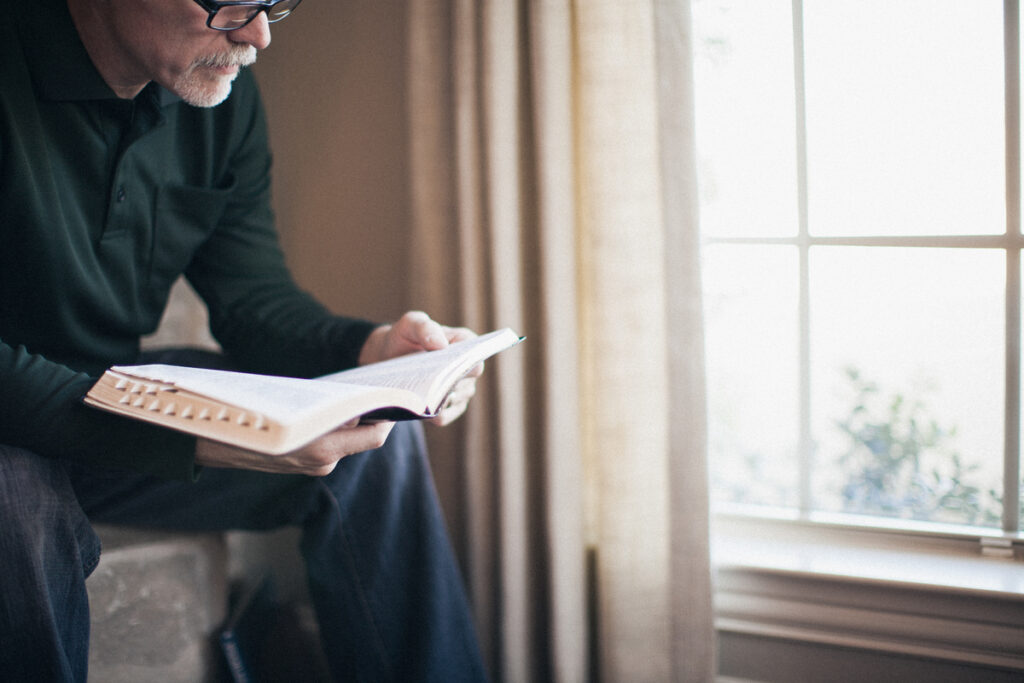Visit nambevangelism.com to get best-in-class tools that help you or your church equip people to share the gospel in any context.
GOD
Freemasonry
Offensive terms such as ‘Jah-Bul-On,’ the so-called secret name of God, are used. Masonic writer Albert Pike, in his Book of the Words, explained the first two syllables of the secret name in his discussion of the old French rituals: “This is probably Jabulum, incorrectly copied; which, as I have shown, meant ‘the product of, that which proceeded, issued or emanated from Om.’ If correctly written, it is compounded of . . . Yu or Yah-u . . . Baal or Bal or Bel, and Om, thus combining the names of the Hebrew, Phoenician and Hindu Deities, to indicate that they are in reality the same. In some old rituals it is Jabulum.” 1
Christianity
Christianity rejects all pagan deities as false gods and goddesses. The idea that followers of Om or Baal worshiped the true God of the Bible but knew Him by a different name is false. No pagan deity is a representation of the God of the Bible. The differences between the God of the Bible and the pagan deities are far greater and significant than the name used to refer to God. No Christian should have any part in a ritual that honors or glorifies a pagan deity.
The Bible
Exodus 20:4: “You shall not make for yourself an idol in the form of anything in heaven above or on the earth beneath or in the waters below.”
Deuteronomy 7:25: “The images of their gods you are to burn in the fire.”
Deuteronomy 11:16: “Be careful, or you will be enticed to turn away and worship other gods and bow down to them.”
Psalms 81:9: “You shall have no foreign god among you; you shall not bow down to an alien god.”
Isaiah 42:8: “I am the Lord; that is my name! I will not give my glory to another or my praise to idols.”
1 John 5:21: “Dear children, keep yourselves from idols.”
OATHS
Freemasonry
Rituals that contain excessive oaths are used. The obligation sworn by the Entered Apprentice: “All this I most solemnly and sincerely promise and swear, . . . binding myself under no less penalty than that of having my throat cut from ear to ear, my tongue torn out by its roots, and buried in the sands of the sea, at low water mark, where the tide ebbs and flows twice in twenty-five hours, should I, in the least, knowingly or wittingly violate or transgress this my Entered Apprentice obligation.”
The Fellow Craft degree candidate promises: “All this I most solemnly and sincerely promise and swear, . . . binding myself under no less penalty than that of having my left breast torn open, my heart plucked from thence, and given to the beast of the field and the birds of the air as prey, should I, in the least, knowingly or wittingly, violate or transgress this my Fellow Craft obligations.”
The Master Mason swears: “All this I most solemnly and sincerely promise and swear, . . . binding myself under no less penalty than that of having my body severed in two, my bowels torn from thence and burned to ashes, and these scattered before the four winds of heaven, that no more remembrance might be had among men or Masons of so vile a wretch as I should be, should I, in the least, knowingly or wittingly violate or transgress this my Master Mason obligation. So help me God and keep me steadfast.” 2
Some Masons claim that these oaths are not taken seriously by candidates today.
Christianity
The Bible warns against making excessive oaths. Therefore, Christians should avoid the kind of oaths found in Freemasonry, which are far worse than the oaths warned against in the New Testament. Christians should let their “yes” be “yes” and their “no” mean “no.”
Christians should take all oaths seriously and not give any oaths rashly.
The Bible
Leviticus 5:4: “Or if a person thoughtlessly takes an oath to do anything, whether good or evil—in any matter one might carelessly swear about—even though he is unaware of it, in any case when he learns of it he will be guilty.”
Matthew 5:34-37: “But I tell you, Do not swear at all: either by heaven, for it is God’s throne; or by the earth, for it is his footstool; or by Jerusalem, for it is the city of the Great King. And do not swear by your head, for you cannot make even one hair white or black. Simply let your ‘Yes’ be ‘Yes,’ and your ‘No,’ ‘No’; anything beyond this comes from the evil one.”
James 5:12: “Above all, my brothers, do not swear—not by heaven or by earth or by anything else. Let your “Yes” be yes, and your “no,” no, or you will be condemned.”
JESUS CHRIST
Freemasonry
Many of the recommended readings for advanced degrees contain pagan and occultic teachings. Several of these Masonic writers deny the uniqueness of Jesus Christ. For example, Rex Hutchens wrote: “The purpose of teaching the concept of a Messiah in Freemasonry is to point out its near universality in the well–developed religions of the ancient world. We see references to Dionysius of the Greeks, Sosiosch of the Persians, Krishna of the Hindus, Osiris of the Egyptians, Jesus of the Christians. The purpose of these varying cultures’ messiahs was to find in human form a source of intercession with Deity; in particular one who, as a human, had been tempted and suffered the daily pangs of life and so could be expected to possess a particular sympathy and understanding; in a word, the messiahs expressed hope.” 3
In addition, some of these writers confuse false pagan beliefs with the teaching of Christianity. For example, Albert Pike confused the Christian Trinity with the Hindu Universal Soul: “Behold the True Masonic Trinity; the Universal Soul, the Thought in the Soul, the Word, or Thought expressed; the Three In One, of a Trinitarian Ecossais.” 4
Christianity
The comparison of Jesus to the pagan deities Dionysius, Sosiosch, and Osiris denigrates the deity of Jesus Christ. The words of Hebrews 2:18 apply to Jesus and Jesus alone. The Bible teaches that Jesus is unique. He is not just one messiah among many.
The Christian doctrine of the Trinity is the belief that there is only one God. Yet, the one God is three distinct Persons: God the Father, God the Son, and God the Holy Spirit. These three have distinct personal attributes, but without division of nature, essence, or being. The “Masonic Trinity” is a complete misrepresentation of the Christian belief. To compare the Triune God of Christianity with Hindu deities is blasphemous.
The Bible
Hebrews 2:18: “Because he himself suffered when he was tempted, he is able to help those who are being tempted.”
John 3:16: “For God so loved the world that he gave his one and only Son, that whoever believes in him shall not perish but have eternal life.”
Acts 4:12: “Salvation is found in no one else, for there is no other name under heaven given to men by which we must be saved.”
1 Timothy 2:5: “For there is one God and one mediator between God and men, the man Christ Jesus.”
Deuteronomy 6:4: “Hear, O Israel: The Lord our God, the Lord is one.”
Matthew 28:19: “Therefore go and make disciples of all nations, baptizing them in the name of the Father and of the Son and of the Holy Spirit.”
Mark 1:9-11: “At that time Jesus came from Nazareth in Galilee and was baptized by John in the Jordan. As Jesus was coming up out of the water, he saw heaven being torn open and the Spirit descending on him like a dove. And a voice came from heaven: “You are my Son, whom I love; with you I am well pleased.”
Acts 1:7-8: “He said to them: “It is not for you to know the times or dates the Father has set by his own authority. But you will receive power when the Holy Spirit comes on you; and you will be my witnesses in Jerusalem, and in all Judea and Samaria, and to the ends of the earth.”
SALVATION BY WORKS
Freemasonry
Many writings of Freemasonry teach that salvation is at least partially dependent upon good works. In commenting on the Christian interpretation of the Blue degrees in Freemasonry, Pike wrote: “Notwithstanding the death of the Redeemer, man can be saved only by faith, repentance, and reformation. Having repented and reformed and bound himself to the service of God by a firm promise and obligation, the light of Christian hope shines down into the darkness of the heart of the humble penitent, and blazes upon his pathway to Heaven. And this is symbolized by the candidate’s being brought to light, after he is obligated, by the Worshipful Master, who in that is a symbol of the Redeemer, and so brings him the light, with the help of the brethren, as He taught the Word with the aid of the Apostles.” 5 Likewise, in concerning the 31st degree, Hutchens stated: “The candidate is brought into the Court of the Dead to be judged for actions while living and to determine if he deserves to dwell among the
gods.” 6
Christianity
The teaching that meritorious deeds can make one acceptable to God is false. There is no deed that will make one acceptable to God. Only the grace of God that
comes through faith in Jesus Christ can save a sinner from the judgment of sin. This saving grace of God is incompatible with any form of works as a requirement for salvation.
The teaching that salvation is in some way dependent upon good works gives people a false hope that they may be found to be acceptable to God apart from personal faith in Jesus Christ.
The Bible
Romans 3:27-28: “Where, then, is boasting? It is excluded. On what principle? On that of observing the law? No, but on that of faith. For we maintain that a man is justified by faith apart from observing the law.”
Romans 4:4-5: “Now when a man works, his wages are not credited to him as a gift, but as an obligation. However, to the man who does not work but trusts God who justifies the wicked, his faith is credited as righteousness.”
Romans 11:6: “And if by grace, then it is no longer by works; if it were, grace would no longer be grace.”
Ephesians 2:8-9: “For it is by grace you have been saved, through faith—and this not from yourselves, it is the gift of God—not by works, so that no one can boast.”
Titus 3:5: “He saved us, not because of righteous things we had done, but because of his mercy. He saved us through the washing of rebirth and renewal by the Holy Spirit.”
Galatians 5:4: “You who are trying to be justified by law have been alienated from Christ; you have fallen away from grace.”
INCLUSIVISM
Freemasonry
The teaching that followers of non-Christian religions will also go to heaven is prominent in Freemasonry. This belief is known as inclusivism. Inclusivism denies that faith in Jesus Christ is the only way of salvation.
Freemasonry holds out the promise of salvation to all worthy Masons, regardless of the deity they worship. The Muslim or Hindu member of the lodge is on the same spiritual level as the believer in Jesus Christ. According to Hutchens, “Masonry is tolerant, even supportive, of the most diversereligious beliefs.” 7
Pike likewise argued that no religion can claim to have exclusivity to the truth, nor can any religion claim to be superior to another. “Toleration, olding that every other man has the same right to his opinion and faith that we have to ours; liberality, holding that as no human being can with certainty say, in the clash and conflict of hostile faiths and creeds, what is truth, or that he is surely in possession of it, so every one should feel that it is quite possible that another equally honest and sincere with himself, and yet holding the contrary opinion, may himself be in possession of the truth, and that whatever one firmly and conscientiously believes, is truth, to him.” 8
Christianity
Personal faith in Jesus Christ is the only way of salvation. Jesus claimed to be “the way and the truth and the life” (John 14:6). He warned that no one “comes to the Father” except through Him (John 14:6). Those who through faith have a personal relationship with Jesus, have eternal life. Those who do not have faith in Jesus do not have eternal life.
The Bible
John 3:36: “Whoever believes in the Son has eternal life, but whoever rejects the Son will not see life, for God’s wrath remains on him.”
John 14:6: “Jesus answered, “I am the way and the truth and the life. No one comes to the Father except through me.”
Acts 4:12: “Salvation is found in no one else, for there is no other name under heaven given to men by which we must be saved.”
1 Corinthians 3:11: “For no one can lay any foundation other than the one already laid, which is Jesus Christ.”
1 John 5:12: “He who has the Son has life; he who does not have the Son of God does not have life.”
NOTES
All Scripture quotations are taken from the Holy Bible, New International Version. Copyright 1973, 1978, 1984 by International Bible Society. Used by permission.
1Albert Pike, The Book of the Words (Kila, Mont.: Kessinger Publishing Co., n.d.), p. 151. (While some Masons may disagree with Pike’s explanation of the secret name for God they cannot
deny the tremendous influence of Pike upon Freemasonry in the United States. A reading of A Bridge To Light — an official publication of the Scottish Rite, Southern Jurisdiction — reveals
that many modern Masonic leaders also confuse the God of the Bible with pagan deities. See A Bridge To Light, pp. 31, 120, 139.
2Annual of the Southern Baptist Convention, 1993 (Nashville: Executive Committee, Southern Baptist Convention, 1993), p. 226. The oaths for the Entered Apprentice, the Fellow Craft
degree, and the Master Mason are all found in the SBC Annual on page 226.
3Rex R. Hutchens, A Bridge to Light (Washington D.C.: The Supreme Council, 1988), p. 112-113.
4Albert Pike, Morals and Dogma of the Ancient and Accepted Scottish Rite of Freemasonry (Richmond, Va.: L.H. Jenkins, Inc., 1942), p. 575.
5Pike, Morals and Dogma, p. 639. Emphasis added.
6Hutchens, A Bridge to Light, p. 300-301.
7Ibid., p. 67.
8Pike, Morals and Dogma, p. 160.
Published March 30, 2010




